
For many rescue dogs, especially those who have lived through trauma and hardship, the journey to healing is quiet and slow. Hidden behind wary eyes and trembling bodies is a longing to feel safe again. Mowgli, a shy rescue pup, is one such survivor. His heartbreaking yet inspiring journey serves as a powerful testament to resilience, showing that even the most fearful dogs can learn to trust again.
Mowgli came into foster care with visible emotional scars. Though his past remained unknown, his behavior told a clear story: he had suffered neglect or abuse. Upon arrival, he sought refuge in the farthest corner of his crate, avoiding all human interaction. The mere presence of a person would send him further into his shell—tail tucked, ears back, gaze averted. He was paralyzed by fear.
Mowgli’s foster family, supported by the rehabilitation-focused rescue organization Cleo’s Legacy, knew the road ahead would require immense patience. Instead of pressuring him, they allowed him the autonomy to adjust at his own pace. The crate door was left open, his space respected, and mealtime became a gentle ritual of encouragement rather than obligation.
By Day 4, a small miracle occurred—Mowgli accepted a treat by hand from a human for the first time. This act, though minor on the surface, was a major breakthrough. It was the first moment he interacted with someone without flinching or retreating. As his foster parent shared, “Rescue doesn’t mean damaged—it means they’ve been let down by humans.”
Each day that followed revealed subtle shifts in Mowgli’s demeanor. He would sniff the air when someone entered the room. He stayed near the crate entrance longer. And then, on Day 11, the moment everyone had waited for: Mowgli stepped out of his crate while a person was present. That tentative step marked the beginning of a new chapter—one of recovery, connection, and hope.
Online viewers who followed Mowgli’s journey shared their heartfelt reactions. One noted, “The way he looks at you—it’s like he’s slowly realizing he’s going to be okay.” It was clear to everyone watching that Mowgli’s transformation wasn’t just emotional; it was spiritual.
In another significant milestone, Mowgli allowed his foster parent to place a collar around his neck. For many dogs with a traumatic history, collars can be associated with force or fear. But in a quiet, gentle moment, Mowgli accepted it without flinching or pulling away. His foster parent later reflected, “He didn’t flinch. He didn’t pull away. It was like he finally understood that we were here to help, not hurt.”
This progress, while steady, is not without setbacks. Healing from trauma is not a linear journey. But with continued love, patience, and understanding, Mowgli is learning that people can mean safety instead of harm.
- Day 1: Mowgli refused to leave his crate when anyone was near.
- Day 4: He took a treat directly from a human’s hand.
- Day 11: He voluntarily stepped out of his crate while someone was in the room.
- Following week: He accepted a collar placement without resistance.
Mowgli’s recovery underscores the essential role foster families and rescue organizations play in giving vulnerable animals a second chance. Not every dog arrives ready to bond, but with compassion and time, even the most fearful can find their way back to trust. It’s in those quiet, tentative steps—and the open crate doors—that true healing begins.
As Mowgli continues his journey of growth and trust, those who witness his transformation are reminded that beneath fear lies a soul waiting to be loved. Mowgli’s story isn’t just about rescue—it’s about redemption.
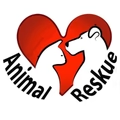
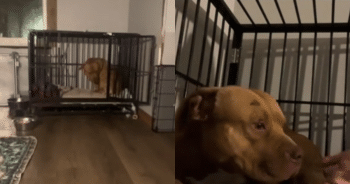



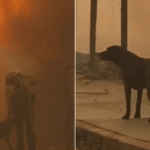
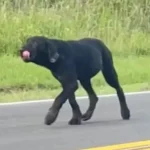
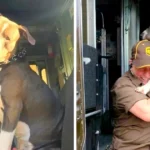

Facebook Comments